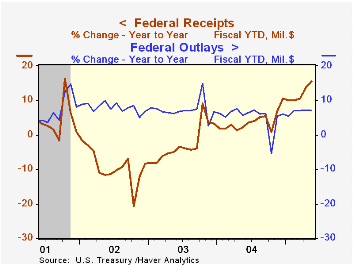 Global| Jun 13 2005
Global| Jun 13 2005U.S. Budget Deficit Continued To Shrink
by:Tom Moeller
|in:Economy in Brief
Summary
The U.S. federal government's budget deficit during the first eight months of FY 2005 continued to shrink versus FY 2004. Red ink of $272.2B was nearly one quarter lower than the $346.3B during the prior fiscal year and was the [...]

The U.S. federal government's budget deficit during the first eight months of FY 2005 continued to shrink versus FY 2004. Red ink of $272.2B was nearly one quarter lower than the $346.3B during the prior fiscal year and was the smallest deficit for the first eight months in two years.
Growth in net receipts continued strong. For the first eight months of FY05, growth of 15.5% y/y was powered by the economy's improvement which caused individual taxes (44% of total receipts) to surge 20.5% and corporate income taxes (10% of total receipts) to nearly double. The improved job market raised employment taxes (36% of total receipts) by 5.9%, up from 1.6% growth last year.
Federal outlay growth was stable at 7.1% versus the first eight months of 2005. Growth in Medicare spending (12% of total outlays) was strong at 9.1% and defense spending (19% of total outlays) grew 6.9%. Spending on social security (21% of total outlays) grew a steady 5.2% and spending on health programs (10% of the total) increased 4.4%. Spending on education & training (4% of the total) increased 18.7% and interest expense (8% of the total) grew 11.1% with higher interest rates versus declines last year.
Blowing the Cover on Stealth Tax from the American Enterprise Institute can be found here.
| US Government Finance | May | April | FY '05 - YTD | FY2004 | FY2003 | FY2002 |
|---|---|---|---|---|---|---|
| Budget Balance | $-35.3B | $57.7B | $-272.2B | $-412.1B | $-377.6B | $-157.8B |
| Net Revenues | $152.7B | $277.6B | 15.5% | 5.5% | -3.8% | -6.9% |
| Net Outlays | $188.0B | $219.9B | 7.1% | 6.1% | 7.4% | 7.9% |
by Louise Curley June 13, 2005

Total Industrial production in Ireland rose 2.9% in April from March while production in manufacturing rose 4.6%.
In addition to the usual industry and market sector breakdowns of total production, Ireland also classifies production between modern industries and traditional industries. The latter are included in the category, "All sectors excluding modern sector". The modern sector includes production of recorded media, chemicals including man-made fibers, computers and instrument engineering, and electric machinery and equipment.
The "Modern" sector has accounted for most of the growth in production over the past several years which has made Ireland one of the better performers among countries of the Euro Zone performers. As can be seen in the attached chart showing the ten year record of production of the modern and traditional sectors, the traditional sector has been virtually flat while the modern sector has risen rapidly.
Now, however, despite the sharp increase in the production of the modern sector in April, the chart also shows that the trend of production in this sector has been flat to negative since early 2003.
| Ireland | Apr 05 | Mar 05 | Apr 04 | Y/Y% | 2004 | 2003 | 2002 |
|---|---|---|---|---|---|---|---|
| Total | 121.36 | 117.93 | 129.60 | -6.36 | 125.08 | 124.45 | 118.40 |
| Manufacturing | 121.08 | 115.79 | 129.50 | -6.43 | 124.47 | 124.23 | 118.57 |
| Modern | 130.57 | 125.44 | 141.70 | -7.85 | 136.00 | 136.82 | 128.76 |
| Total excluding modern | 105.43 | 103.77 | 108.90 | -3.19 | 107.82 | 104.77 | 101.72 |
Tom Moeller
AuthorMore in Author Profile »Prior to joining Haver Analytics in 2000, Mr. Moeller worked as the Economist at Chancellor Capital Management from 1985 to 1999. There, he developed comprehensive economic forecasts and interpreted economic data for equity and fixed income portfolio managers. Also at Chancellor, Mr. Moeller worked as an equity analyst and was responsible for researching and rating companies in the economically sensitive automobile and housing industries for investment in Chancellor’s equity portfolio. Prior to joining Chancellor, Mr. Moeller was an Economist at Citibank from 1979 to 1984. He also analyzed pricing behavior in the metals industry for the Council on Wage and Price Stability in Washington, D.C. In 1999, Mr. Moeller received the award for most accurate forecast from the Forecasters' Club of New York. From 1990 to 1992 he was President of the New York Association for Business Economists. Mr. Moeller earned an M.B.A. in Finance from Fordham University, where he graduated in 1987. He holds a Bachelor of Arts in Economics from George Washington University.
More Economy in Brief
 Global| Feb 05 2026
Global| Feb 05 2026Charts of the Week: Balanced Policy, Resilient Data and AI Narratives
by:Andrew Cates






